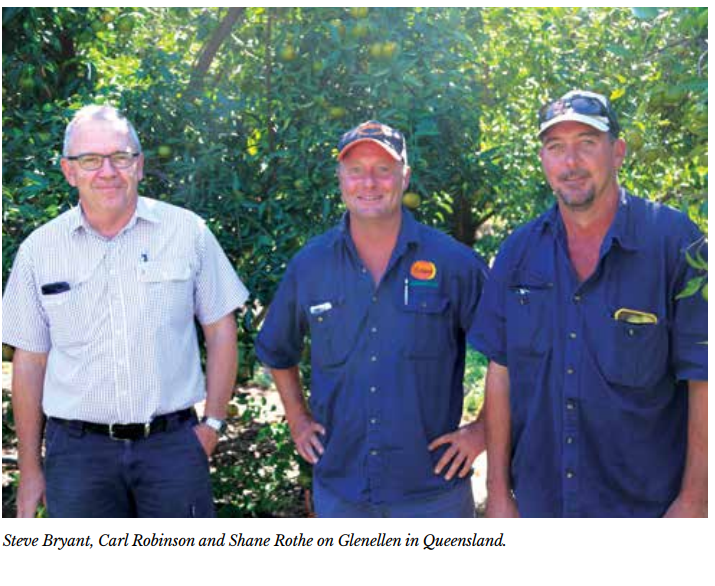27 October 2021
The days of being an island are over
Carl Robinson is a fourth-generation citrus grower in Gayndah, Queensland, working with the family business since he left school.
His role as Operations Manager oversees the orchard production from growing, pruning, packing and marketing the fruit grown on the property.
Glenellen, located in the North Burnett Region of Queensland, has approximately 120 hectares of citrus.
The orchard, approaching its centenary year, currently grows Eureka lemons, Imperial mandarins, Low Seeded Murcotts, Honey Murcotts and their own variety, the Empress-A mandarin.
When Citrus Australia visited his farm earlier this year, Carl said “the days of being an island” were coming to a close, as it becomes more challenging to grow and market citrus.
“We have begun to work together with our neighbouring farms and help each other, instead of competing against each other in the same marketplace,” Carl said.
Carl’s father, the late Frank Robinson, spent 20 years developing the Empress – a mandarin variety – and Carl said it has been extremely popular on the export market.
“Dad was quite passionate about the citrus industry and was very well respected,” Carl said. Frank Robinson became known as one of the first growers to successfully plant mandarin trees on granite country.
“The hilly country on the property provided a new area for development,” Carl said.
“At the time, the citrus trees were predominately grown on the river flats of the Burnett River.
In the early years, dynamite was used to break up the rock shelves.
This was a new concept and proved to be successful.

“To this day, granite promotes good tree growth on the property.”
Tree health is paramount and Glenellen uses agronomic nutritional advice from local consultants.
“Soil and leaf tests are another helpful tool we use to monitor and implement the nutritional needs of the orchard,” Carl said.
“The nutrition of the trees is forever changing due to climatic conditions and weather patterns.
Trace elements, foliar and dry fertilisers, together with compost help produce a healthy tree and top-quality fruit.
“This approach has proven to be successful over many years, however you always have to be willing to work with and adapt with mother nature.”
Packing Shed The current packing shed has been in operation since 2010.
The new shed predominately exports to international markets and domestically to independent retailers.
The Robinsons have always packed their own fruit on the property.
The original packing shed still stands as a reminder of days past.
Carl’s mother, Allison, managed the packing shed for over 50 years.
Local folklore considered it to be one of the oldest working citrus packing sheds in Australia.
Carl said when it came to the management of a large working packing shed, communication and building relationships are two important elements.
“The main benefit to growing and packing your own fruit, is knowing your product and being able to build good relationships with marketers.”
Loyalty has been a large part of the marketing program and relationships have been built with both domestic and export buyers over decades.
“Transparency in production and sales of our fruit is important to us.
It gives pleasure as a grower to know your fruit is well received in the marketplace by the consumer.”
Carl said he had noticed a shift in the consumer trends in the marketplace.
“There are now fewer independent retailers who we sell to with a greater supply of fruit going to the supermarket chains.
The consumers are shopping in one place for all their needs and essentials, and this includes where they purchase their fruit.
“We embrace the many challenges ahead of us and look forward to providing top quality mandarins to Australia and the rest of the world for many years to come.”
Membership
You are not logged in
If you are not already a member, please show your support and join Citrus Australia today. Collectively we can make big things happen.
